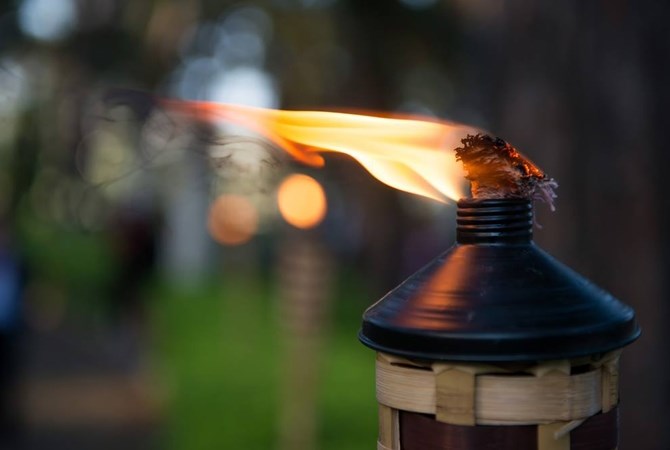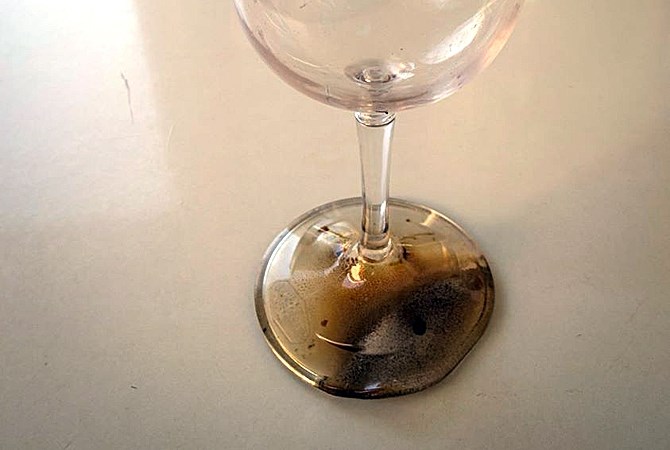
Tiki torches are just one of the things Wildfire B.C. wants put away until the extreme fire rating has passed.
Image Credit: Shutterstock
July 08, 2015 - 2:42 PM
‘SOMEONE IN AN INTERFACE AREA WAS USING A BLOW TORCH TO GET RID OF THEIR WEEDS’
KELOWNA – This hot, dry summer makes beach days all the more necessary, but it has taken at least some of the fun out of other favourite Thompson-Okanagan pastimes.
By now we should all know that, during fire season especially, campfires and cigarettes tossed on the ground are big no-nos, and hopefully you don’t need to be told burning weeds with a blow torch is considered risky as well. But did you know even golf courses are stepping up regulations?
Kelowna Fire Department fire prevention officer Gayanne Pacholzuk says conditions are so dry the department took the unusual step of calling golf courses asking them to impose a no smoking policy. She says some of the courses have already instituted bans but others needed to be told.
“They went ‘Oh, wow, I didn’t even think of that,” she says. “So when we’re doing things like that we certainly don’t want to be issuing permits for pyrotechnics.”
That's why the City of Kelowna also decided to rescind a permit to the Kelowna Falcons for a fireworks display after their charity game at Elks Stadium today, July 8.
“It doesn’t send a good message,” she says. “I think a lot of people will be disappointed but they’d have to understand there is an extreme risk.”
Pacholzuk says the list of items that can cause a fire is long, and people need to start thinking outside the box and examining everything they do until the extreme fire risk passes.
“I’ve seen a piece of glass sitting in the blazing sun light a little fire,” she says. “It was just sitting on their deck against their wall and it lit it on fire. People have to think about little things like that.”
And she certainly doesn't recommend a method one Kelowna resident used to maintain his yard.
“Yesterday we had a call and someone in an interface area was using a blow torch to get rid of their weeds,” she says. “I’m not kidding you.”

Vancouver resident Matt Jackish posted a photo to Facebook of a plastic wine glass that almost caught fire this week.
Image Credit: Matt Jackish via Facebook
And for those of you who enjoy a little wine with your hot, dry summer nights, be aware that even that can now start a fire.
Earlier this week Vancouver resident Matt Jackish posted a photo of a plastic wine glass found by his friend. The curved base of the glass sitting in full sun acted as a lens, causing the table beneath it to blacken and smoke.
“It had magnified the heat of the sun and a large chunk of the table was smouldering,” he writes. “When she doused it in water, it hissed significantly. I shudder to think what would have happened had it not been discovered in time.”
Kelsey Winter of the Kamloops Fire Centre says many things that can cause fires are obvious, like tiki torches, fireworks, flare guns and campfires. Still others are less well-known. Small engines, if hot enough, can start a fire if they touch something combustible.
That means the exhausts of off-road vehicles, chainsaws and heavy equipment.
“I think it’s just habit and maybe people forget,” she says. “Lots of people are enjoying the back country on motorbikes, but their tailpipes get really hot and if that touches some dry grass it can start a little fire.
“Hot things start fires.”
The fire risk in much of B.C. is currently high to extreme. About 200 active wildfires are currently burning in the province and help from Ontario has been arriving this week. Of the wildfires that have hit the province this season about 10 have burned more than 10,000 hectares and 18 remain of note, meaning they are larger than 100 ha or are considered interface fires.
To contact the reporter for this story, email Adam Proskiw at aproskiw@infonews.ca or call 250-718-0428. To contact the editor, email mjones@infonews.ca or call 250-718-2724.
News from © iNFOnews, 2015